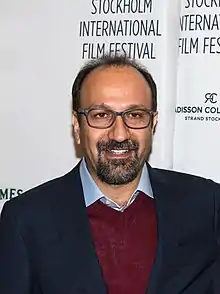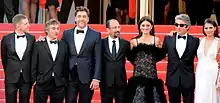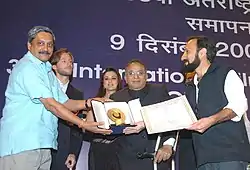Asghar Farhadi
Asghar Farhadi (Persian: اصغر فرهادی; Persian pronunciation: [æsɢæɾ ɛ fæɾhɑːdiː] ![]() pronunciation born 7 May 1972)[1] is an Iranian film director and screenwriter.
pronunciation born 7 May 1972)[1] is an Iranian film director and screenwriter.
Asghar Farhadi | |
|---|---|
 Farhadi at Stockholm International Film Festival 2018. | |
| Born | 7 May 1972 |
| Alma mater | Tarbiat Modares University University of Tehran |
| Occupation |
|
| Years active | 1997–present |
Notable work | About Elly (2009) A Separation (2011) The Past (2013) The Salesman (2016) Everybody Knows (2018) |
| Spouse(s) | |
| Children | 2; including Sarina |
Farhadi has received two Oscars for Best Foreign Language Film for his films A Separation (2011) and The Salesman (2016), making him one of the few directors worldwide who have won the Academy Award for Best Foreign Language Film twice. In 2012, he was included on the annual Time 100 list of the most influential people in the world.
Early life
Farhadi was born in Homayoon Shahr, a city located in the Isfahan province near the city of Isfahan which, soon after the 1979 Islamic Revolution, was renamed to Khomeini Shahr after Ayatollah Khomeini.[2] He is a graduate of theatre, with a BA in Dramatic Arts and MA in Stage Direction from University of Tehran and Tarbiat Modares University, respectively.[3]
Career
Early Films
At the start of his career, Farhadi made numerous short 8mm and 16mm films in the Isfahan branch of the Iranian Young Cinema Society, before moving on to writing plays and screenplays for IRIB. He also directed such TV series as A Tale of a City and co-wrote the screenplay for Ebrahim Hatamikia's Low Heights. In 2003, Farhadi made his feature film debut with Dancing in the Dust.[4] He followed with The Beautiful City, released in 2004. His third film, Fireworks Wednesday, won the Gold Hugo at the 2006 Chicago International Film Festival.
About Elly (2009)
In 2009, Farhadi directed his fourth film, About Elly, won him the Silver Bear for Best Director at the 59th International Berlin Film Festival and also Best Picture at the Tribeca Film Festival. The latter film is about a group of Iranians who take a trip to the Iranian beaches of Caspian Sea that turns tragic. Film theorist and critic David Bordwell has called About Elly a masterpiece.[5]
A Separation (2011)
His film A Separation premiered on 9 February 2011 at the 29th Fajr International Film Festival in Tehran and received critical acclaim from the Iran Society of Film Critics. It earned Farhadi four awards including Best Director (for the third time after Fireworks Wednesday and About Elly). On 15 February 2011, it also played in competition at the 61st Berlin International Film Festival, which received a Golden Bear for best film, becoming the first Iranian film to win that award. In June 2011, A Separation won the Sydney Film Prize in competition with Cannes Festival's winner The Tree of Life, directed by Terrence Malick.[6] It also won the Best Film award at the 2011 Asia Pacific Screen Awards.
On 19 December 2011, Farhadi was announced as being a jury member for the 62nd Berlin International Film Festival, which was held in February 2012.[7]
On 15 January 2012, A Separation won the Golden Globe for the Best Foreign Language Film.[8] The film was also the official Iranian submission for the Best Foreign Language Film at the 2012 Academy Awards where, in addition to being nominated[9] in this category, it was also nominated in the Best Original Screenplay category. On 26 February 2012, A Separation became the first Iranian movie to win the Academy Award for Best International Feature Film, at the 84th Academy Awards. This marked Farhadi as the first Iranian to have won an Academy Award in any of the competitive categories.[10] He was invited to join the Academy of Motion Picture Arts and Sciences in June 2012, along with 175 other members.[11] A Separation also won the César Award for Best Foreign Film and the Independent Spirit Award for Best International Film in 2012.
The Past (2013)

In 2013, Farhadi's film The Past starring Bérénice Bejo and Tahar Rahim was released. This would be Farhadi's first film in the French language. The film competed for the Palme d'Or at the 2013 Cannes Film Festival.[12] Bejo won the Best Actress Award at Cannes for her performance in the film.[13][14]
The film received universal critical acclaim. It holds a 93% "certified fresh" rating on review aggregator website Rotten Tomatoes, based on 144 reviews with a weighted average score of 8.2/10 and the site's consensus: "Beautifully written, sensitively directed, and powerfully acted, The Past serves as another compelling testament to Asghar Farhadi's gift for finely layered drama."[15] On Metacritic, the film has a normalized score of 85% based on 41 reviews, indicating "universal acclaim".[16]
The film was selected as the Iranian entry for the Best Foreign Language Film at the 86th Academy Awards,[17] but it was not nominated.
The Salesman (2016)
His 2016 film The Salesman, starring Shahab Hosseini and Taraneh Alidoosti, competed for the Palme d'Or at the 2016 Cannes Film Festival. The Salesman won two Awards: Best Actor for Shahab Hosseini and Best Screenplay for Farhadi.[18]
On 26 February 2017, Farhadi won his second Oscar for Academy Award for Best International Feature Film for The Salesman at the 89th Academy Awards. The Salesman had already won the award for the Best Screenplay at the Cannes Film Festival. Following Donald Trump's executive order barring Iranians from entering the country, Farhadi said he would not attend the 2017 Academy Awards, despite being nominated, and then winning, for the best foreign-language film.[19] He announced that two prominent Iranian Americans, Anousheh Ansari and Firouz Naderi would represent him in the ceremony.[20] Anousheh Ansari is famed for being the first female space tourist and first Iranian in space, and Naderi as director of Solar Systems Exploration at NASA.[21] A few hours before the ceremony, he addressed a group of protesters in London via a video link from Iran. The Mayor of London, Sadiq Khan, screened the movie publicly in Trafalgar Square as a celebration of the city's diversity.[22] "This solidarity is off to a great start," he told them. "I hope this movement will continue and spread, for it has within itself the power to stand up to fascism, be victorious in the face of extremism and say no to oppressive political powers everywhere."[23]
After winning the Academy Award for the second time, Farhadi had a prepared statement read by Anousheh Ansari. "I'm sorry I'm not with you tonight," Farhadi's statement read. "My absence is out of respect for the people of my country and those of the other six nations who have been disrespected by the inhumane law that bans entry of immigrants to the U.S. Dividing the world into the us and our enemies categories creates fear, a deceitful justification for aggression and war. These wars prevent democracy and human rights in countries which themselves have been victims of aggression. Filmmakers can turn their cameras to capture shared human qualities and break stereotypes of various nationalities and religions. They create empathy between us and others -- an empathy that we need today more than ever." Prior to the ceremony, all five directors nominated for foreign language film issued a joint statement, obtained by USA Today, that condemned "the climate of fanaticism and nationalism" in the United States, among other countries. The directors - Farhadi, Maren Ade (Toni Erdmann), Hannes Holm (A Man Called Ove), Martin Zandvliet (Land of Mine) and Bentley Dean and Martin Butler (Tanna) - said that no matter which films wins, the Oscar is dedicated to "all the people, artists, journalists and activists who are working to foster unity and understand, and who uphold freedom of expression and human dignity - values whose protection is now more important than ever."[24]

Everybody Knows (2018)
In 2018, Farhadi directed his eighth feature film titled, Everybody Knows starring Javier Bardem, Penelope Cruz and Ricardo Darin. The film, a Spanish psycholohical thriller debuted at the 71st Cannes Film Festival where it played in competition for the Palme d'Or.
At the Toronto premiere of Everybody Knows, the director shared with Ikon London Magazine his plans to "Come to London West End with his play". He said "I know there is a lot of great plays every day. And I wish one day I do a play there. It is not far. It is our plan."[25]
The film has earned critical acclaim earning a 78% on Rotten Tomatoes with the critics consensus reading, with critics praising the two leads, but adding that the film is below Farhadi's usually high standards.[26]
Themes
Social and class structures
.jpg.webp)
Farhadi's films present a microcosm of modern Iran and explore the inevitable complications that arise via class, gender, and religious differences. For example, his 2011 film A Separation portrays various intractable conflicts and arguments that force the characters to reflect on the moral grounds of their own decisions.
In her article, "Through the Looking Glass: Reflexive Cinema and Society in Post-Revolution Iran," Norma Claire Moruzzi writes:
In contrast, Farhadi's A Separation treats the life-as-elsewhere dream as one strand of a complex and multi-layered story. Farhadi's films are nuanced portraits of the cross-cutting relations among classes, genders, and social groups. They are ambivalent explorations of the implications small personal choices can have on the delicate web of individual connections that make up any social network, carefully crafted and beautifully acted.[27]
The film critic Roger Ebert in his Movie Yearbook 2013 writes this about Farhadi's craft depicting social relations:
"The writer-director, Asghar Farhadi, tells his story with a fair and even hand. His only agenda seems to be to express empathy. A Separation provides a useful portrait of Iran today . . . [T]his film portrays a more nuanced nation, and its decent characters are trying to do the right thing" (532). "The intriguing thing about his screenplay is that it gets us deeply involved, yet never tells us who it thinks is right or wrong" (703).[28]
In the introduction to her 2014 book Asghar Farhadi: Life and Cinema, film critic Tina Hassannia writes:[29]
[Farhadi's] social realism—observations on the culture at large driven through a documentary-like lens—is skilfully effaced by a highly refined version of the melodrama. Yet his social commentary—though bleak, sometimes damning—never feels didactic or punishing.
In Farhadi's films, Iran is depicted as having a rigid class system that endures across the history of pre- and post-revolutionary Iran. Farhadi films the complexities of everyday life in contemporary Iran, with a particular focus on the ways in which diverse perspectives are embedded within social structures such as class and gender. Farhadi has his own style like "open ending movies", being realistic and "narrative gaps".[30]
Cultural norms
Farhadi's films frequently criticize divisions in Iranian society along class, gender and religious lines. However, they are notable for their subtlety of treatment. Farhadi himself has never rejected Iran, most of his films are deeply rooted in urban Iranian society, and he has frequently expressed his commitment to the country and its people, most notably on the two occasions when he won the Academy Award. When he picked up the award for A Separation, he dedicated the win to the Iranian nation. When The Salesman won the prize a few years later, Farhadi declined to attend the event in protest at the policies of the American administration.
What is less noticed is his veiled criticism of religious standards in Iran. His debut feature Dancing in the Dust opens with the Islamic invocation Bismillahir Rahmanir Rahim (In the name of Allah, the most benevolent, the most merciful) just as a hand cleans a car window to reveal a large statue of a man, situated on a pedestal in a street. Idolatry is forbidden in Islam, and the construction of human statues likewise discouraged in strict interpretations. For his second film, Beautiful City, Farhadi repeated a similar cinematic trick; as a prison microphone blares out the Bismillah phrase, it is revealed that a young man is carving human figurines. Neither film has been released in the West, and they have not been seen as widely as his latter films.[31]
Influences
In 2012, Farhadi participated in the Sight & Sound film polls of that year. Held every ten years to select the greatest films of all time, contemporary directors were asked to select ten films of their choice. Farhadi's choices are listed below, in alphabetical order:[32]
- Rashomon (Japan, 1950)
- The Big Road (China, 1935)
- The Godfather Part I (USA, 1972)
- Tokyo Story (Japan, 1953)
- The Apartment (USA, 1960)
- Three Colors: Red (France, 1994)
- Take the Money and Run (USA, 1969)
- Persona (Sweden, 1966)
- Taxi Driver (USA, 1976)
- Modern Times (USA, 1936)
Filmography
Feature films
| Year | Title | Director | Writer | Producer | Notes |
|---|---|---|---|---|---|
| 2003 | Dancing in the Dust | Yes | Yes | Yes | Co-written with Alireza Bazrafshan and Mohammad Reza Fazeli |
| 2004 | The Beautiful City | Yes | Yes | Yes | |
| 2006 | Fireworks Wednesday | Yes | Yes | Yes | Co-written with Mani Haghighi |
| 2009 | About Elly | Yes | Yes | Yes | |
| 2011 | A Separation | Yes | Yes | Yes | |
| 2013 | The Past | Yes | Yes | No | |
| 2016 | The Salesman | Yes | Yes | Yes | |
| 2018 | Everybody Knows | Yes | Yes | Yes | |
| 2021 | A Hero | Yes | Yes | Yes | |
Producer Only
- Low Heights (2002) Co-written with Ebrahim Hatamikia
- Canaan (2007) Co-written with Mani Haghighi
- Tambourine (2008)
- Trial on the Street (2009) Co-written with Masoud Kimiai
Television
| Year | Title | Director | Writer | Producer | Broadcast |
|---|---|---|---|---|---|
| 1998 | The Waiter | Yes | Yes | Yes | IRIB TV5 |
| 1998 | Doctors | No | No | Yes | IRIB TV3 |
| 1998 | Farrokh & Faraj Residental Complex | Yes | No | No | IRIB TV2 |
| 1999 | Youth days | No | No | Yes | IRIB TV5 |
| 1999 | Story of a City | Yes | Yes | Yes | IRIB TV5 |
| 2001 | Story of a City II | Yes | Yes | Yes | IRIB TV5 |
Awards and nominations
Farhadi is one of a select list of directors who have won the Best Foreign Film Oscar more than once. The others are Vittorio de Sica and Federico Fellini (four times each), Ingmar Bergman (three times), and Rene Clement and Akira Kurosawa (twice each). The following is a selection of his major awards.
A Separation won the Academy Award for Best Foreign Language Film in 2012, becoming the first Iranian film to win the award. The film was nominated for the Academy Award for Best Original Screenplay.
The Salesman won the Academy Award for Best Foreign Language Film in 2017. However, Farhadi did not attend the 89th Academy Awards ceremony in protest of the U.S. Executive Order 13769.
Honors
- Legion of Honour French (2012)
- Foreign Policy Top 100 Global Thinker (2012)[35]
See also
- Cinema of Iran
- Persian cinema
References
- Soureh Movie Database Archived 21 October 2013 at the Wayback Machine
- Harvey, Giles (31 January 2019). "How Iran's Greatest Director Makes Art of Moral Ambiguity". The New York Times. ISSN 0362-4331. Archived from the original on 2 April 2019. Retrieved 2 April 2019.
- "Asghar Farhadi". Asia Pacific Screen Awards. Retrieved 2 April 2019.
- "NESHANE". Archived from the original on 10 February 2006. Retrieved 13 August 2006.
- "A masterpiece, and others not to be neglected". Archived from the original on 6 September 2015.
- "2011 SFF Official Competition winner is..." News. Sydney Film Festival. 19 June 2011. Archived from the original on 16 March 2012. Retrieved 5 July 2011.
- "Berlinale 2012: International Jury". berlinale.de. 19 December 2011. Archived from the original on 18 January 2012. Retrieved 21 December 2011.
- "Golden Globes: 'A Separation' wins best foreign language film". Los Angeles Times. 15 January 2012. Archived from the original on 19 January 2012. Retrieved 16 January 2011.
- ""A Separation" nominated for foreign-language film Oscar". Tehran Times. 25 January 2012. Archived from the original on 2 March 2012.
- Ronald Grover. "Iran wins first Oscar with "A Separation". Reuters. Archived from the original on 27 February 2012. Retrieved 27 February 2012.
- "Academy Invites 176 to Membership". The Academy of Motion Picture Arts and Sciences. 29 June 2012. Archived from the original on 2 July 2012. Retrieved 19 July 2013.
- "2013 Official Selection". Cannes. 18 April 2013. Archived from the original on 17 October 2013. Retrieved 18 April 2013.
- "Cannes Film Festival: Awards 2013". Cannes. 26 May 2013. Archived from the original on 17 October 2013. Retrieved 26 May 2013.
- Chang, Justin (26 May 2013). "Cannes: 'Blue Is the Warmest Color' Wins Palme d' Or". Variety. Archived from the original on 7 June 2013. Retrieved 26 May 2013.
- "Le passé (The Past) (2013)". Rotten Tomatoes. Fandango. Retrieved 16 February 2018.
- "The Past Reviews". Metacritic. Retrieved 29 April 2014.
- "Iran selects 'The Past' for 2014 Academy Award submission". Press TV. Retrieved 29 September 2013.
- "Festival de Cannes 2016". Archived from the original on 26 October 2016. Retrieved 26 October 2016.
- Donadio, Rachel; Erdbrink, Thomas (29 January 2017). "Iranian Director Asghar Farhadi Won't Attend Oscar Ceremony". The New York Times. Archived from the original on 29 January 2017. Retrieved 30 January 2017.
- Harvey, Giles (31 January 2019). "How Iran's Greatest Director Makes Art of Moral Ambiguity". The New York Times. ISSN 0362-4331. Archived from the original on 2 April 2019. Retrieved 2 April 2019.
- "Iranian director to send famous proxies to Oscars in his place". 24 February 2017. Archived from the original on 27 February 2017. Retrieved 27 February 2017.
- Bowley, Graham (14 February 2017). "London Mayor to Screen Iranian Film in Trafalgar Square on Oscar Night". The New York Times. ISSN 0362-4331. Archived from the original on 2 April 2019. Retrieved 2 April 2019.
- "An Iranian director protesting Trump's travel ban sent a space traveller to pick up his award". 26 February 2017. Archived from the original on 27 February 2017. Retrieved 27 February 2017.
- "The Salesman Director Delivers Powerful Statement Against Trump (While Boycotting the Ceremony)". 27 February 2017. Archived from the original on 27 February 2017. Retrieved 27 February 2017.
- Orlova-Alvarez, Tamara; Alvarez, Joe (25 September 2018). "Film Director Asghar Farhadi's plans for London West End". Ikon London Magazine. Archived from the original on 29 September 2018. Retrieved 29 September 2018.
- "Everybody Knows". Rotten Tomatoes. Retrieved 6 May 2020.
- Moruzzi, Norma Claire. "Through the Looking Glass: Reflexive Cinema and Society in Post-Revolution Iran". From Iranian Cinema in a Global Context: Policy, Politics, and Form By Peter Decherney, Blake Atwood. Routledge. NY: 2015. 112-142 https://books.google.co.uk/books?id=p0ODBAAAQBAJ&printsec=frontcover&dq=inauthor:%22Peter+Decherney%22#v=onepage Archived 27 December 2018 at the Wayback Machine
- Ebert, Roger (4 December 2012). Roger Ebert's Movie Yearbook 2013 (25th Anniversary ed.). ISBN 9781449423117. Archived from the original on 4 October 2018. Retrieved 22 August 2016.
- Tina Hassannia (2014). Asghar Farhadi: Life and Cinema. Critical Press.
- Lee, Nam (12 April 2019). "Iranian Cinema in Transition: Relative Truth and Morality in Asghar Farhadi's Films". DigitalCommons.
- Asghar Farhadi: Life and Cinema by Tina Hassannia, Critical Press, 2014
- "Asghar Farhadi's Top 10 Director's Poll". British Film Institute. Retrieved 27 May 2020.
- "Cannes: 'Blue Is the Warmest Color' Wins Fipresci Prize". Variety. 26 May 2013. Archived from the original on 7 June 2013. Retrieved 26 May 2013.
- "Archived copy". Archived from the original on 13 June 2017. Retrieved 13 June 2017.CS1 maint: archived copy as title (link)
- "The FP Top 100 Global Thinkers". Foreign Policy. 26 November 2012. Archived from the original on 30 November 2012. Retrieved 28 November 2012.
External links
| Wikimedia Commons has media related to Asghar Farhadi. |
